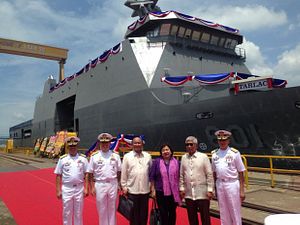This week, Indonesian Foreign Minister Retno Marsudi paid a visit to the Philippines, where she met with top officials including President Rodrigo Duterte. Though the agenda itself was more wide-ranging, her trip put the spotlight on the progress both sides are trying to make on some common security challenges.
Indonesia and the Philippines, both founding members of the Association of Southeast Asian Nations (ASEAN) and situated in maritime Southeast Asia, have long sought collaboration on common security challenges. That continues to be the case today as both countries pay closer attention to rising transnational threats like terrorism and seek to increase collaboration in maritime security in areas including the Sulu-Sulawesi Seas.
With respect to countering terrorism and extremism, the two countries and other Southeast Asian states have been looking at various bilateral, subregional, regional, and extraregional measures that can be taken to tackle the challenge posed by individuals and groups. Of particular concern is the Islamic State, whose reach into Southeast Asia was most clearly demonstrated in the siege of the southern city of Marawi in May last year but has also conducted attacks in other Southeast Asian countries including Indonesia (See: “ASEAN’s Post-Marawi Islamic State Challenge”).
And on the maritime security front more specifically, apart from measures each country is undertaking on their own, both sides, along with Malaysia, have begun trilateral patrols in the Sulu-Sulawesi Sea, which are slowly starting to take shape despite continued challenges (See: “Confronting Threats in the Sulu-Sulawesi Seas: Opportunities and Challenges”).
Marsudi’s visit this week provided an opportunity for both sides to discuss current and future areas of cooperation, including on the security side. During her trip, she met with several top Philippine officials including Duterte himself, discussing a wide range of issues including trade, maritime security, countering terrorism and extremism, and education.
On maritime security, Duterte told Marsudi that he wanted to intensify cooperation with Indonesia to address the continued challenge of foreign terrorists infiltrating the Philippines. As I have noted before in these pages, even amid growing collaboration, the porousness of some of the borders of Southeast Asian states, combined with other issues related to enforcement and the sheer scale and scope of the problem, means that the problem of infiltration and the very idea of “foreign fighters” is a difficult one to address.
On terrorism and extremism more generally, both sides discussed measures being taken to manage the challenge. One area of particular focus was education. According to a statement released by Duterte’s office, Duterte mentioned an interest in providing scholarships for Muslim students enrolled in Islamic institutions, while Marsudi noted that Indonesia was interested in sharing its experiences with respect to Islamic education with the Philippines as well as Southeast Asia more generally.
Few details were provided on the Indonesian offer on Islamic education. But it is in line with what some Indonesian officials have characterized as the country’s “soft approach” to addressing terrorism and extremism as the world’s largest Muslim-majority county and an important aspect of Jakarta’s regional and global contributions in this respect. The two sides have also already been discussing areas for further collaboration on Islamic education as a way to manage the challenge of radicalization, including concluding a memorandum of understanding.
There was also some discussion of some elements of subregional cooperation between the two sides, even though this does not often make the headlines (See: “ASEAN Subregional Cooperation in the Spotlight with BIMP-EAGA Meeting”). Both sides talked about the opening up of routes to boost trade and investment, while Marsudi also said the Indonesian government wanted to confer passports for people of Indonesian descent living in Mindanao – yet another manifestation of the people-to-people ties between the two countries.
































